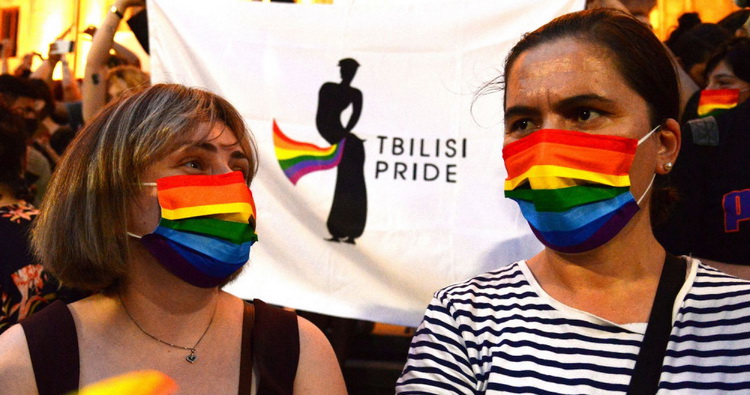Foreign Policy: "The Geopolitical Fault Line Behind the Attack on Tbilisi Pride"

Participants wear rainbow masks during a rally in the Georgian capital Tbilisi on July 6, in support of those who were injured in an attack on Tbilisi Pride organisers the previous day. Photo: Vano Shlamov/AFP/Getty Images.

While the violence against queer activists and journalists in Tbilisi on July 5 could be interpreted as a reflection of the global culture war, the right-wing groups' attacks illustrate more specific geopolitical struggles over the country's future, a new piece from Foreign Policy says.
Authored by Amy Mackinnon, national security and intelligence reporter of the publication, the article describes the storming of the Tbilisi Pride queer event organisers' offices and physical violence against around 50 journalists by the conservative groups, and delves into its wider causes.
As in many countries in Eastern Europe and Central Asia, a broader tug of war over the country’s direction has coalesced around the issue of LGBT rights. Conservative groups, including the Georgian Orthodox Church, [...] are staunchly opposed to Georgia’s long-standing ambitions to join the European Union and NATO
- Amy Mackinnon for Foreign Policy
Symbolised by the removal of the European Union flag from its pole in front of the Parliament on Georgia twice over two days by the violent counter-demonstrators, the political and cultural clash between the conservative sections of the society and its official policy is also reflecting on the local politics, the article shows.
While support for joining the EU is high in Georgia—over 80 percent, according to a poll conducted last year—large pockets of the population are socially conservative and very religious, which has proved to be fertile ground for homophobia
- Amy Mackinnon for Foreign Policy
This was demonstrated by allegations by Tbilisi Pride organisers and their supporters of government collusion with the attackers, and an earlier statement from the prime minister that connected the queer march with political goals of division by former president Mikheil Saakashvili.
The role of Russia in utilising the divisions in societies in the former Soviet republics is also an element in divisive events, including the passing of anti-liberal legislation in a number of eastern European states over the years, the FP piece notes.
Read the full story here.
 Tweet
Tweet  Share
Share